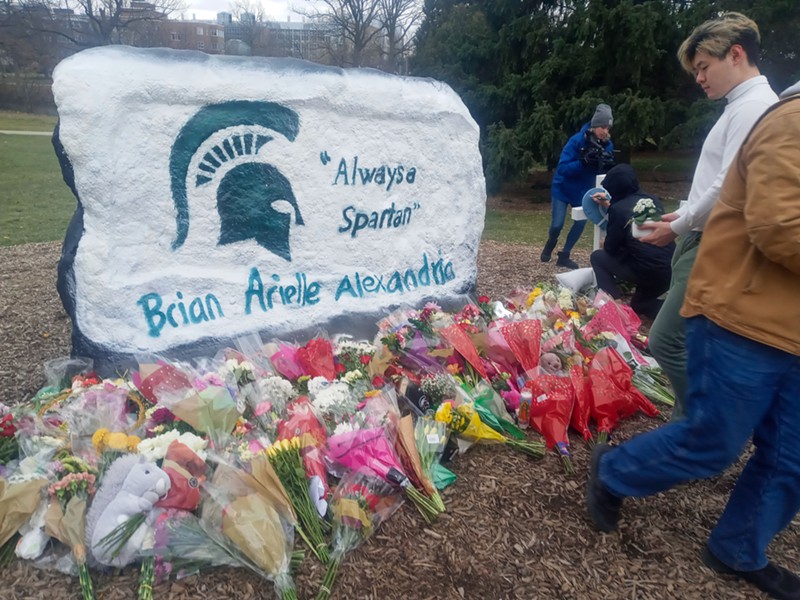
Eleanore Catolico
Students drop flowers in front of “The Rock” on MSU’s campus before the school-organized vigil for shooting victims began last week.
Maya Manuel had barely slept. The day before was Valentine’s Day, and the 20-year-old Michigan State University junior had forgotten about the lovers’ holiday. She stands before a mourning crowd of hundreds outside the state capitol building in downtown Lansing, gathered to peacefully protest, to bear witness. Less than 48 hours earlier, a masked gunman invaded Spartan country, killing three students, and critically injuring five. The tragedy triggers a chilling truth. Preparing for the blunt force of mass death has become a hallmark of learning.
Manuel, who helped organize the demonstration, remembers being a little kid when her teacher explained how an active shooter killed students who resembled her. She remembers sitting on the floor, practicing lockdown drills in the event a stranger comes and tries to kill her at school. Now, she’s all grown up. Many of these students have witnessed the Sandy Hook, Parkland, and other school shootings from afar. Now, a similar disaster scarred the beloved campus, so close to the city where Manuel was raised. MSU’s name has been added to the ledger of communities left broken and uncertain after a mass shooting, a uniquely American scourge.
The psychology major is angry and afraid. “Please look at me. Look at me and understand my pain. Look at these students right here and understand their pain, before you act like you understand us,” Manuel says, still processing these losses. “You haven’t been us. And hopefully soon you’ll never be us. But it could be any of you. It could be anywhere, at any time. And the sad part is I only feel protected to come here today because I know there are important people here.”
Dozens of MSU students occupy the capitol building’s concrete steps. A swarm of news photographers rush to capture the grief-stricken tableau. The moments of contemplating near-death drain the vibrancy in their eyes. They sit silently. Many carry blank stares as they ignore the flashing cameras. Some hold makeshift signs which broadcast their agony and a cruel new normal: “America is a Loaded Gun,” “Fuck Your Thoughts & Prayers,” “Our Blood, Your Hands.” These students are the surviving class of the 67th mass shooting in the U.S. in 2023, barely two months into the new year. The tragedy also marks the second mass shooting in the Great Lakes State in less than two years.
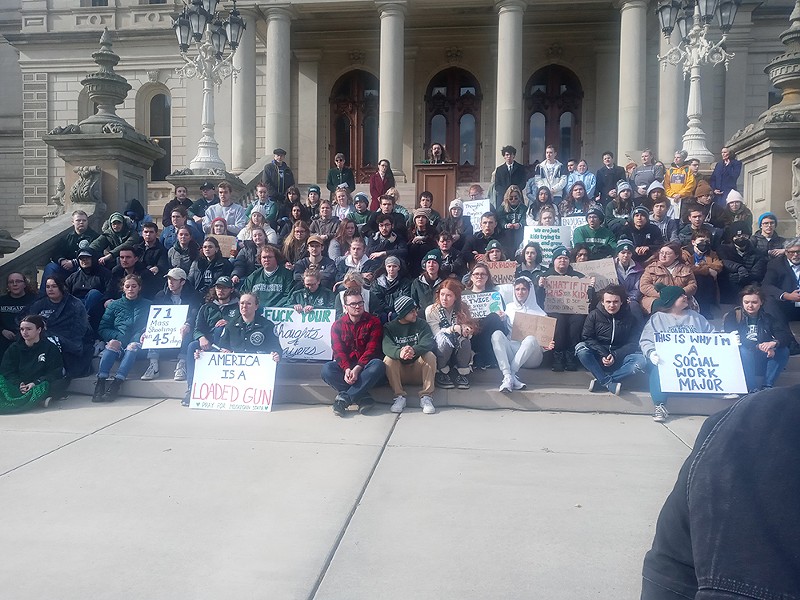
Eleanore Catolico
MSU students sit quietly on the capitol step buildings during a youth-led demonstration last week.
Being there requires courage. Two days before, a flurry of police alerts ordered them to shelter-in-place and run, hide, and fight. Thousands, stuck inside apartments and dormitories and stores as the shooter trekked the grounds, feared those excruciating hours would be their final ones alive. Despite a mass exodus of fellow classmates who fled home to embrace their families and a mass influx of outsiders descending onto the campus when they feel vulnerable and unsafe, these students stay. They can’t stomach how once cherished places of study and community transformed into ground zeroes of terror. They hate being known as the lockdown drill generation.
Powerful gusts shake the leafless trees under a muted sky. Nearby church bells clatter. The dried-up front lawn is peppered with forlorn faces. The lawmakers who vowed to take action once again. The heartbroken people from the town of Oxford, where a shooting in 2021 left four students dead. They traveled almost a hundred miles to share their outrage for another community shocked by suffering. Oxford and MSU are now bonded in grief. One by one, the students walk up to the podium.
It is Jamison Bandivas’s 22nd birthday. The MSU senior and fraternity brother is visibly torn apart because of his proximity to Monday’s carnage. He was 100 feet away from the Union, where one of the shootings happened. He saw a girl running out of the building, screaming. “A guy came up to us and said someone walked in the unit and just shot the clerk,” he tells the crowd. “And then she started screaming, ‘My boyfriend is the clerk!’ And then she keeps begging her boyfriend to pick up the phone, and he didn’t pick up the phone.”
“You don’t want to have a doomsday plan,” she says. “We don’t want to live in a world like this.”
tweet this
He barricaded himself inside a nearby Target. Customers cried. Then he saw a girl who found a Valentine’s Day card. On that card, she wrote a goodbye letter. “I thought, ‘Why do we have to do this?’” Then Bandivas saw an international student, totally panicked. He tried to calm him down. The student told him how his parents warned him about the U.S.. “This is what we’re known as around the world,” Bandivas says, who is the son of Filipino immigrants. “I have to ask myself, is this the American Dream they wanted for me?” Right now, he feels like this shooting was a close call, but his chances of survival are running out. “Next time, I am dead,” he says. The girl’s scream has been ringing in his head ever since.
Alaina Dockery, a 20-year-old woman who lives a couple blocks away and works at a local Speedway gas station, plants herself on the shriveled up grass. She stands alone as she watches people close to her age recount the raw and graphic and disturbing details of their survival. They process their sorrow and express guilt because walking and breathing now feels like a privilege.
While growing up in Muskegon, Dockery knows how bullets destroy a body. Her mother worked inside a hospital where they performed open heart surgery. She saw people after they were shot, which made her more worried about her daughter’s safety. Dockery knows how trauma can live in the mind even if a person never confronts a loaded gun. The night of the shooting, a ripple of fear plagued her roommate, an MSU sophomore, who was at the home they shared but still prepared a goodbye note for his parents he was ready to send anyway. “You don’t want to have a doomsday plan,” she says. “We don’t want to live in a world like this.”
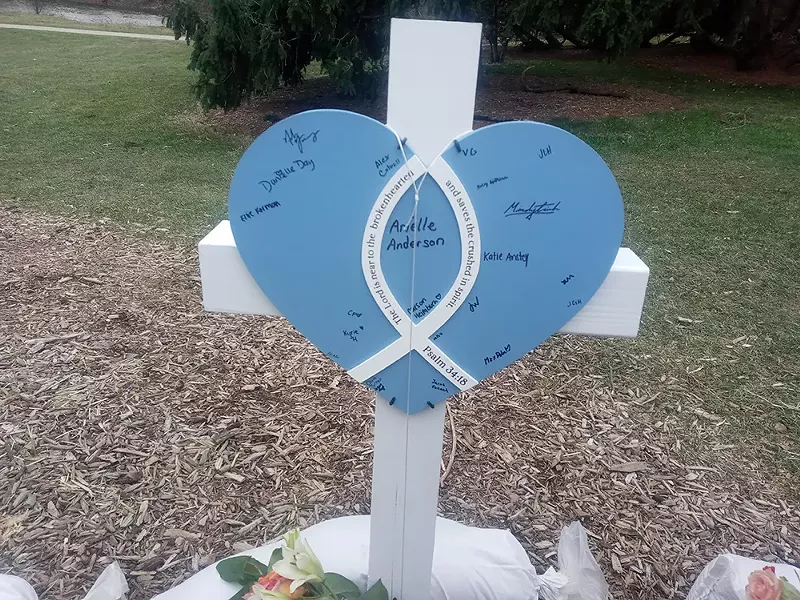
Eleanore Catolico
One of the white crosses honoring one of the students killed, Arielle Diamond Anderson. She dreamed of becoming a doctor.
At first, Monday seemed ordinary and uneventful for Ellie Barron, a 19-year-old sophomore who dreams of becoming a wildlife veterinarian. She had a morning class at Berkey Hall, many hours before two students were shot and killed during a Cuban history class. She skipped out on a bracelet-making party at the Union, another site of horror. Instead, she worked on a scholarship project she had put off because of nerves and a lack of belief in herself. In the early evening, she went to ultimate frisbee practice, where they would talk about how to reach nationals. That’s when a team member got an alert on their Apple Watch about the shooting. Barron began frantically texting her friends.
“I was asking them where they are and if they’re safe. And one of my friends was in the bathroom at Berkey, hiding with 72 other people,” she says. “And she was telling me that she loved me. And she was telling me that she was scared. And I wanted to tell her that it was all going to be OK. But I couldn’t because I didn’t know it was going to be. I didn’t know if I was ever going to see her again.” Barron, her team, and hundreds of others sheltered inside the weight room, wondering whether or not they were going to live to see another sunrise. “We were crying and freaking out and making plans for what to do if the shooter came in,” she says.
Barron wants people to know her life matters. Her friends’ lives matter. Her classmates’ lives matter. She shouldn’t have had to wonder whether or not she would see her friends and family again. She shouldn’t have had to jump every time a water bottle dropped onto the floor. She shouldn’t have had to hide behind exercise equipment. Her voice is quivering as she speaks into the microphone. She hopes people will understand what happened to her. What happened here.
Palpable dread and memories of shootings thicken the blistering, wintry air. Haphazard bangs from a nearby construction crane startle the already emotionally fragile students, proving how life after gun violence invokes hyper-vigilance of once mundane noises. Some MSU students have already endured these fears. They’ve already lived through a mass shooting within their short lifetimes.
Hours pass by. Some camera crews depart. The crowd thins. Still, tearful testimonials pour out of these students, as they cry for change: stricter gun laws, a future where they don’t have to feel so afraid. They came to MSU for an education. But here they are, thrust into the spotlight as the school shooting epidemic’s latest victims. “How many more?” has been the collective refrain of the last few days. After the alerts and the goodbye letters and the desperate texts and calls to loved ones, they are still fighting for their lives. Would anybody listen?
Grieving in real time
Anthony McRae, the 43-year-old man police identified as the suspected gunman, later shot and killed himself a few miles from campus, according to police. Ever since, these horrific deaths and injuries cast a pall over the usually lively and warm place of learning. The massive school grounds stretch 5,200 acres across the heart of East Lansing, and more than 50,000 students attend MSU. Over the years, the public university has gained notoriety for its business, education, and agriculture programs; Big Ten sports teams; and a bevy of illustrious alumni, including NBA Hall of Fame point guard Earvin “Magic” Johnson.
In the wake of the shooting, school officials canceled classes for about a week. The routine drumbeats of studying and tests and grades may prove difficult to follow once students return to classes. How could anyone focus on academics after such a painful and harrowing chapter? And the collective grief is accompanied by more questions without answers. Why do mass shootings happen at all? Will students and staff ever feel safe again? Will the same cycle of rapidfire media coverage and empty platitudes play out like it has everywhere else people have been injured and murdered by active shooters? How many more?
David DeFelice, the director of MSU’s English Language Center, tries to stay chipper. He chaperones a group of roughly a dozen Japanese students sporting black winter coats as they walk together in an almost single-file line along the mostly empty sidewalks of Lansing. They reach a bus stop near Red Cedar River and wait to catch a ride back to campus. These students, all from Nagoya University, came to the Midwestern college town hoping to improve their English proficiency skills. They are here to study for a few more weeks before flying back home.
The students were eating dinner in Landon Hall when the alerts arrived and were locked down until past midnight. “This was really traumatic for them,” DeFelice says. DeFelice is upset that students who’ve come from across the world had their experience ruined. The tragedy may stain how they view the U.S.. (In Japan, gun violence is rare, though last year, the country’s former prime minister Shinzo Abe was assassinated by a man with a home-made firearm.) So he and other faculty members are encouraging students to attend ongoing listening sessions or put together flowers for makeshift memorials honoring the dead. “The families that are suffering right now, what they’re going through, I can’t even imagine,” he says. The bus rolls up, picks up DeFelice and the students, and cruises down the road, toward the lonely quiet of the campus.
There are some whispers of everyday college life. Gaggles of students shuffle down winding paths or chat and laugh as they sip coffee inside a Starbucks on East Grand River Ave. There’s still feverish typing on MacBooks. These whispers coexist alongside totems of grief. Bouquets of store-bought flowers — luscious red roses, hot pink carnations, sunny yellow tulips — droop atop a concrete ledge outside of Berkey Hall, a roughly 80-year-old building perched on the northside of campus. Students have taken sociology and public policy courses inside, but the wooden double doors are now closed off by yellow police tape. The building remains shuttered for the spring semester. More flowers are fanned around the base of a tall, slim tree nearby. There’s rarely a person who passes by who isn’t moved to stop before these shrines. In a city painted in green and white, the light of Spartan nation has slightly dimmed.
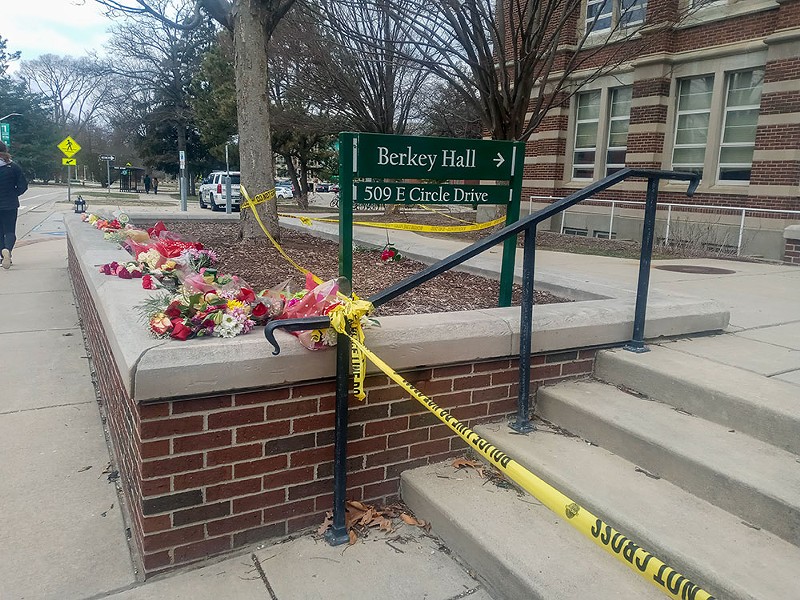
Eleanore Catolico
Bouquets of flowers are strewn across a ledge outside of Berkey Hall, where the shooting occurred.
Below dreary clouds, a pilgrimage to The Rock, a boulder situated next to the school auditorium known for the messages students scrawl on it, begins a little after 5 p.m. This is where a vigil organized by university officials would commence. The collective mourning has spread far beyond the borders of MSU as solemn vigils have occurred elsewhere. Thousands of mourners trek across a mini-bridge overlooking a muddy river. They carry more flowers and little white candles, and flood the lawn surrounding the boulder, now a bastion of sorrow. A holy ground. The boulder’s bumpy facades are spray painted with the messages like “Always a Spartan,” and “We Stand Spartan Strong” along with the names of those who died.
They mourn the promise of the young lives lost forever: Arielle Diamond Anderson, a 19-year-old junior from Harper Woods, who dreamed of becoming a pediatrician. Brian Fraser, a 20-year-old sophomore from Grosse Pointe, was a fraternity president. Alexandria Verner, a 20-year-old junior from Clawson, was a star student and athlete. Three short, white crosses with powder blue hearts commemorate each of the fallen students. Scrolled across the hearts are hand-written signatures. More students trample over wood chips to drop more flowers piling around the boulder, gaze at the names: Brian, Arielle, and Alexandria. They had much left to give to the world.
The inspirational ballad “You’ll Never Walk Alone” soars from loudspeakers. A chaplain delivers a brief sermon to comfort the weary souls. The mourners light candles and lift them toward the sky above. There are still five students recovering inside nearby Sparrow Hospital after doctors and nurses treated their wounds and helped them hold on. One of the critically injured is John Hao, an international student from China. He’s now paralyzed from the chest down, per media reports. The sight of bullets and bloodshed was so unbearable that the hospital’s lead medical chief teared up during a press conference the morning after the tragedy. Nothing seems to eclipse the vigil’s eerie silences. More speakers describe their pain and implore the crowd to hold their loved ones close: Gov. Gretchen Whitmer, Board of Trustees Chair Rema Vassar, men’s head basketball coach Tom Izzo, among others.
“I just want to know why he targeted the college kids,” he says. “That’s all.”
tweet this
Jo Kovach, the undergraduate student body president, had spent the day talking to school leaders from across the country who’ve endured the fears of mass shootings before. This wasn’t the work she’d envisioned for herself. This wasn’t supposed to be her job. She pays homage to the lost students. “These beautiful, amazing Spartans were taken from this world senselessly, but they will never be forgotten by each and every one of us tonight,” she says. She tells the classmates huddling together, sullen and soundless in front of her that it’s OK for them to grieve. “There’s no rulebook telling you what to do in these situations,” she says. She warns them to protect their mourning against media who’d treat their grief as a “sideshow” before the nation’s eyes. Moments later, there is a stirring rendition of “Amazing Grace.” Then more consoling words. United in grief, they sway to the school’s anthem “MSU Shadows.” The vigil ends. Thousands of mourners slowly disperse. An ocean of sorrowful eyes ebbing and flowing in slow motion.
It’s almost midnight. A few blocks away from The Rock, 32-year-old security guard Christoval Hernandez checks IDs outside the door of The Tin Can Bar, a once bustling, afterhours haunt with a dive-y vibe that’s now a little barren. The bar is usually brimming with students playing pong on Wednesday nights. There’s a few students drinking here together as hard rock songs play in the background. One is sitting at the bar alone with AirPods in, scrolling through his smartphone.
As a parent, Hernandez is already preparing his 7-year-old daughter for the worst when she grows up, like teaching her CPR, because he won’t always be there for her. He doesn’t think he’ll be around for that long. Hernandez wasn’t on campus the night of the shooting, but a bunch of students began blowing up his phone and freaking out. He wasn’t afraid because he’s seen violence firsthand as a National Guard veteran who manned barracks in Iraq. But he was afraid for those students. He worries the days following the shooting may hurt local businesses like The Tin Can Bar in the long run, but another trouble hangs in his head: “I just want to know why he targeted the college kids,” he says. “That’s all.”
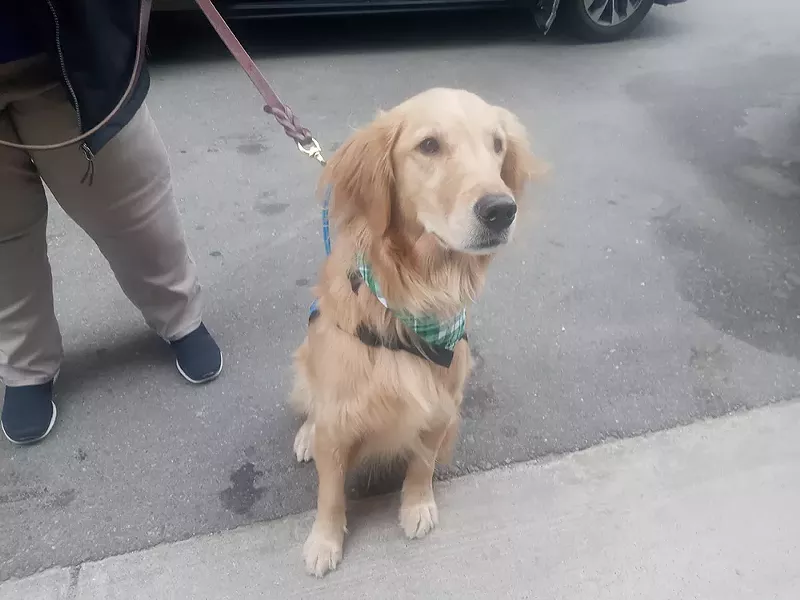
Eleanore Catolico
Claudia, a comfort dog, has been walking around campus trying to bring students and staff calm.
Guilty for being alive
The day after the school-organized vigil, rains shower the city. The listening sessions are still underway across campus. A golden retriever named Claudia frolicks outside the revolving door of the ritzy Graduate hotel. She is jovial and friendly as her long tongue sticks out of her mouth. There are a few older volunteers who’ve come along to help. Claudia is among a small group of trained comfort dogs from Toledo who’ve been visiting local vigils and churches to help bring calm for people in distress. The “comfort dog ministry” was created by Lutheran Church Charities. “We don’t like coming to these things,” says Bonnie Fear, the organization’s crisis response coordinator. “But we know that when they do happen, we’ll be there for these people.” Fear and Claudia hop into a van and head to another site.
Inside the Graduate, the lobby is buzzing as people lounge in sofa chairs, order coffee, and hover over to the front desk. Warm lights glow. Wisley Silva is a 35-year-old teacher from Brazil who’s enrolled in a teacher methodology program here at MSU. He’s been staying at the hotel for the last several weeks. During this cold and wet morning, Silva is still consumed by the tragedy. In his home country, he has seen violence before in big cities: violence from the drug trade, crimes of passion, robberies. But a mass shooting? Those kinds of acts are rare. He doesn’t spout lists of names of cities where those kinds of shootings have occurred in Brazil, like so many people can do here in America. It’s hard for Silva to recall even a few examples. The shooting still fogs his thoughts. “I have never experienced something like this,” he says. “Just knowing that a person can [go] into a school or university and kill people just because they want to. There’s no reason for that.”
The night of the shooting, Silva just had dinner with friends at a campus building nearby. The group was walking on the sidewalk, on their way back to the hotel. They were walking right past Berkey Hall when they heard a loud bang. Then Silva’s friend asked if the noise was a gunshot. Silva looked up. He saw students inside Berkey trying to break the windows. At first, Silva thought the students were committing vandalism. Then he saw students running and screaming. That’s when he and his friends started to run. Then the cop cars and helicopters came —the moment when Silva knew what was happening was something much bigger and more sinister. He and his friends ran back to the hotel and sheltered-in-place. Then he heard the news that three people were killed. He started to feel sick. “I cried a lot,” he says. “I couldn’t sleep.”
He wasn’t afraid or traumatized. He is a father of a six-year-old daughter. He thought about how she could die from a tragedy like this. He felt guilty for still being alive. Silva’s mind began to spiral, as his imagination drafted more painful close calls. What if he was outside the Union? What if he had to start to run? If he was there, he may have encountered the shooter. “Probably, I wouldn’t be here talking to you,” he says.
As he barricaded himself inside the hotel, Silva called his wife and told her he was safe. He told his wife not to tell his mother because he was worried she’d get panicked and sick. She’s already in poor health. People back home were worried too. His students. His home of São Bento. Now, the days after feel strange. “Everything became normal,” he says. Some of his classmates told him these kinds of tragedies happen, but they have to move on with their lives. They asked him where they should go eat lunch. “How could you think about lunch at this moment?” Silva remembers telling them.
He hasn’t gone to a listening session because he’s really shy and didn’t have the courage to speak up. This is his first time talking about what happened, and afterwards, he feels a little better. Right now, he doesn’t feel safe at all, but then again he’s always felt a little unwelcome as an immigrant, often noticing suspicious stares. He knows he’ll never walk near Berkey again. Passing by there would trigger memories of those atrocious moments. “When I close my eyes, I can hear the guns. I can hear people running,” he says. “I can hear the cops, sirens. And for me, it’s very complicated to go back there.”
The days after the shooting have unveiled an onslaught of more harrowing stories and more unsettling details of the suspected shooter. There have been more vigils. There have been funerals for the students who died. Angry people, scared people, confused people. Legislators vowing change to gun laws. GoFundMe pages have sprouted up for those still recovering from their injuries. There’s been an emotional men’s basketball game between MSU and long-time rival University of Michigan filled with heartfelt tributes. There are those who may want to tell their stories of what happened and the aftermath and how they’ll try to cope. And those who don’t want anything to do with the media. There are still those still recovering from the shock and trauma. There are those who have completely moved on. More questions without answers, again and again.
A passionate opinion piece from the editorial board of The State News, the student newspaper, demanded leaders extend the break. “Our school is broken. Our home is destroyed,” the editorial board wrote. On Sunday afternoon, university officials announced classes would resume on Monday, seven days after the massacre that scarred Spartan nation forever. Maybe those students who return to classes will finally break the silence.
Follow us: Google News | NewsBreak | Reddit | Instagram | Facebook | Twitter


